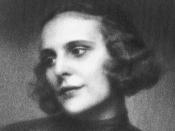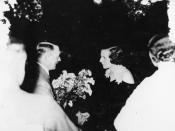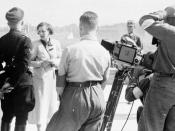Describe Leni Riefenstahl's role in German culture up to 1933.
Helene (Leni) Bertha Amalie Riefenstahl was born on 22 August 1902 in Berlin. Her family had a relatively privileged economic status ensuring that they were protected from much of the economic, social, and political unrest which, consequently, was one component that allowed Leni to indulge in her career as a dancer. As a child, Leni loved dancing, gymnastics and the theatre and, although her mother Bertha was supportive of her desires, her father Alfred dismissed her aspirations. He stereotypically maintained that performing on the stage was only for lower class women. However, regardless of what her father speculated, by 1918 Leni had secretly (with the help of her mother) enrolled herself at the Grimm-Reiter Dance School in Berlin. Her father soon discovered his daughter's deceit and enrolled her in boarding school at the Lohmann School in Thale, where she was forbidden to express her dance.
Upon returning after her schooling, Leni was asked to work as a secretary in her father's office and, as a substitute, she addressed the issue of her return to dance classes, assuring she would not dance on stage to which he initially agreed. Her father then later lost his temper and forbade her from dancing, to which Leni's mother again persuaded him to allow Leni to learn dance and perform. At this point, her father's concern only allowed her to enroll in the Jutta Klamt School where Leni further excelled in the art of dance.
Leni performed her first solo dance recital at the age of twenty one in October 1923 at the Munich Tonhalle. After her second recital, the great theatrical director, Max Reinhart signed Leni up for a contract with him, performing at several dances at his theatres and later touring Europe.


